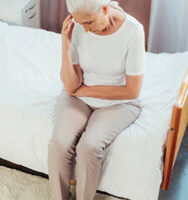Bed Sores are a Sign of Nursing Home Neglect

Bed sores are a serious problem in nursing homes, with about 11% of nursing home residents in the U.S. suffering from at least one, according to the Centers for Disease Control and Prevention. Also called pressure sores or pressure ulcers, these wounds typically develop in areas where the skin is close to the bone, such as the shoulder blades, heels, and buttocks.
If a loved one is in a facility and suffering from a bed sore, they may be the victim of neglect. You should consult with an experienced nursing home abuse attorney in Daytona Beach for more information about how to protect their rights.
How Bed Sores Develop
Any prolonged pressure on the body can eventually limit the amount of blood that flows to the affected area. As a result, a person’s skin begins to break down and become thinner, ultimately leading to an ulcer. Bed sores can also be caused by prolonged rubbing or shearing.
To prevent bed sores, nursing home staff needs to regularly move residents, preferably every few hours. If they do not, then bed sores can develop. When staff has been neglectful, they also will not catch bed sores early, compounding the problem, since more serious bed sores are harder to treat.
Stages & Treatment
Doctors classify bed sores into four different stages, depending on the severity of the sore.
-
Stage 1. The area is red although the skin has not been broken. Around 3% of nursing home residents suffer from a Stage 1 sore.
-
Stage 2. There has been a partial loss of skin thickness, and a blister or shallow crater may form. This is the most common bed sore, with 5% of the nursing home population suffering from one.
-
Stage 3. The sore has broken through the skin, exposing underlying tissue. This is the least common bed sore, with about 1% of all nursing home residents suffering from a Stage 3 bed sore.
-
Stage 4. This is the deepest bed sore, exposing bone or muscle. About 2% of all nursing home residents suffer a Stage 4 bed sore.
The sooner doctors begin treating the sore, the better. Generally, doctors will try to clean the wound by removing dead tissue and then keeping it properly covered. Patients might also need to receive antibiotics to prevent infection and drugs to reduce discomfort. Staff should also begin regularly moving the patient, so that new sores do not develop and existing ones do not worsen.
Checking on Your Loved One
Obviously, it is not realistic to perform a full body search of your loved one each time you visit the nursing home. However, you can certainly ask them how they are feeling and if they are experiencing any discomfort. Then you can ask staff to investigate if your loved one is in pain. Staff should notify you if they find a bed sore. If not, then you should follow up with nursing home management and also reach out to an attorney.
At Bundza & Rodriguez in Daytona Beach, our nursing home abuse lawyers understand that many of our state’s long-term care facilities make critical errors. They are often understaffed and poorly trained, leading to injuries which they do not want to acknowledge. For more information about how we can help hold the nursing home accountable, please contact us by calling 386-252-5170.
Resource:
cdc.gov/nchs/products/databriefs/db14.htm
https://www.daytonalawyers.com/arbitration-agreements-nursing-homes/

